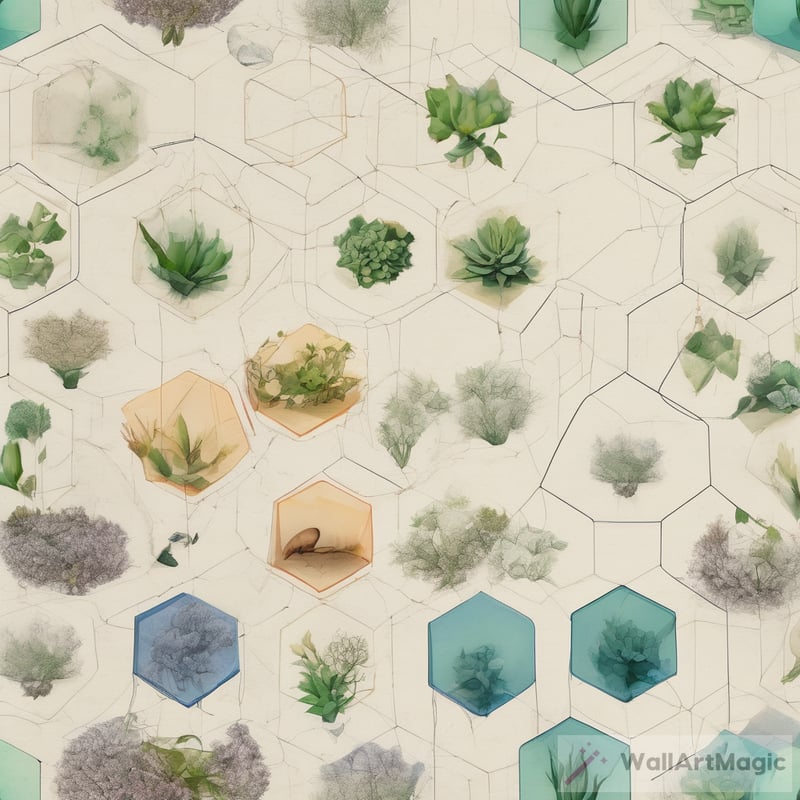Plant Phenology Hexagon Art Blog

The single hexagon represents the cycle of plant phenology, showcasing the wave-like pattern of growth, flowering, and fruiting. Each corner symbolizes a different stage, from dormancy to senescence. This visual representation highlights the interconnectedness of nature and the importance of timing in agricultural practices. #PlantPhenology #NatureCycle #HexagonArt
Visualizing Plant Phenology: Seasonal Waves in a Single Hexagon

Sketching plant phenology as seasonal waves within a single hexagon can provide a visual representation of how plant lifecycles change throughout the year. From budding and blooming in spring to fruiting and dormancy in winter, each season can be depicted as a wave within the hexagon. This unique art prompt highlights the cyclical nature of […]
Visualizing Plant Phenology: Hexagon Waves

Plant phenology, the study of cyclic and seasonal natural phenomena in plants, can be visualized as waves within a hexagon. Each wave represents a different stage of plant growth throughout the year, from budding in spring to dormancy in winter. By mapping out these seasonal changes, we can better understand the timing and patterns of […]
Plant Phenology Hexagon Art

Sketching plant phenology as seasonal waves within a hexagon can be a beautiful way to visualize the changes in plant life throughout the year. From the budding of flowers in spring to the vibrant colors of autumn foliage, each season brings its own unique cycle of growth and dormancy. By capturing these changes within the […]
Exploring Plant Phenology through Waves of Photo-Thermal Responses

Plant phenology is the study of how plant life cycles are influenced by seasonal variations. Waves of photo-thermal responses dictate when plants bloom, leaf out, and go dormant. Understanding these cycles is crucial for agriculture and ecology. #PlantPhenology #SeasonalVariations #PhotoThermalResponses
Exploring Plant Phenology: Waves of Photo-Thermal Responses

Plant phenology is the study of timing in plant life cycles, influenced by changes in climate and temperature. As the seasons shift, plants respond to environmental cues with waves of photo-thermal responses, dictating when they bloom, leaf out, or go dormant. This intricate dance within a single hexagon shape represents the delicate balance of nature’s […]
Plant Phenology: Waves of Photo-Thermal Responses

Explore the intricate relationship between plant phenology and photo-thermal responses. Discover how plants synchronize their growth stages with environmental cues. Learn how phenology impacts ecosystems and agriculture. #PlantPhenology #PhotoThermalResponses #Ecosystems #Agriculture
The Waves of Plant Phenology

Plant phenology is the study of how plants respond to environmental changes over time. Just like waves moving through water, plants exhibit photo-thermal responses that drive their growth, development, and reproduction. These responses are influenced by factors such as temperature, sunlight, and precipitation, shaping the beautiful patterns we see in nature. Understanding plant phenology is […]
Modelling Phenology in European Beech Forests

Modelling phenology in European beech forests helps predict when trees will bud, bloom, and shed leaves based on temperature and sunlight patterns. These cycles follow waves of photo-thermal responses, impacting ecosystem dynamics and biodiversity. By studying these patterns, researchers can better understand how climate change affects forest ecosystems. #EuropeanBeech #ForestPhenology #ClimateChange
Exploring Plant Phenology: Understanding Seasonal Changes

Explore the fascinating world of plant phenology, the study of how plants change over the course of a year in response to seasonal changes. Learn how factors such as temperature, light, and moisture impact plant growth and development, influencing when plants bloom, produce fruit, and shed their leaves. Discover the important role phenology plays in […]








